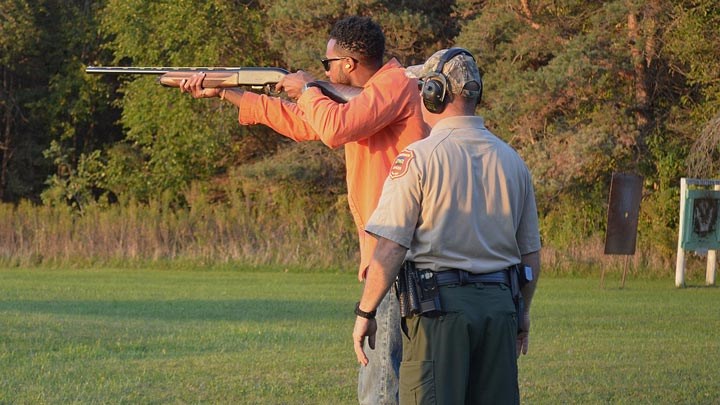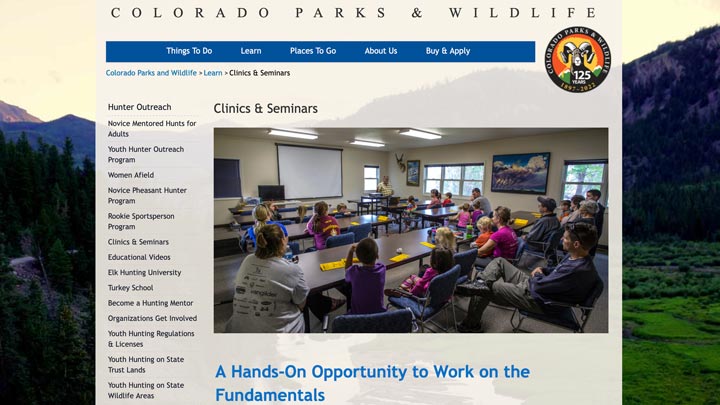
by Courtney Nicolson, Associate Director of Communications, Sportsmen’s Alliance - Thursday, June 2, 2022

When those of us in the hunter education world speak about how to increase the number of hunting licenses purchased by hunters in the United States, there is a definitive plan of attack called R3. This term refers to Recruitment, Retention and Reactivation. Launched in 2016, the national R3 community is a group of professionals who work with the Council to Advance Hunting and the Shooting Sports to discuss partnerships, resources and motivations to grow the numbers in our ranks.
Most attention is often focused on the first R: Recruitment. Indeed, recruitment seems like the biggest pool to dive into considering less than 5 percent of Americans are hunters, meaning the other 95 percent represent a wide-open opportunity. Of course, you can’t have the additional two R’s without first creating a hunter. Historically, recruitment happened at home at a young age. An overwhelming number of hunters began as children, following around their family patriarch through the woods. In recent years it’s inspiring to see an abundance of adult-onset hunters coming from non-hunting families. I am one such hunter.
I took hunter education at the age of 23. I made a few hunting friends in the state of New York, where I was living at the time, and it was a sorrowful goodbye when my company relocated me to Denver, Colo., at age 28. “But who will I go duck hunting with?” I lamented as I packed my boxes.
I started a group called Colorado Women Who Hunt on the old Meetup.com website, and at our first meet-and-greet event, I heard many stories. “I used to hunt until … .” This was my first real interaction with the third R—Reactivation. As I met more and more women (our group grew to over 300), I heard three common reasons as to why people weren’t hunting. The first two were: “I used to hunt with my family and didn’t continue the tradition,” and “I used to hunt and then moved somewhere new and didn’t have friends to go with or places to go.” However, the story I heard the most was: “A significant other introduced me to hunting, we separated, and I never hunted again.”
Retention and Reactivation are circular processes that can happen to a hunter. Retention is best defined as retaining a hunter who will purchase hunting licenses annually and spend time afield in pursuit of game. The longer a hunter stays out of the active stage, the harder it becomes to reactivate. Since we already have the three Rs of R3, I added a new acronym called P4: Places, Partners, Products and Parenting. Each of these four P’s can be an opportunity for Reactivation or a roadblock.
Places
I meet many hunters who hunted growing up but then went off to college and never hunted again. The roadblock created by a change in location can be significant. If you grew up hunting on your family farm, the entire concept of scouting might be foreign. Before digital mapping tools, knowing where public and private land intersected was challenging. Hunting whitetail deer on your family farm in Wisconsin is different from hunting elk on public land in Colorado. Simply the process of applying for a license may seem overwhelming.
Colorado Parks and Wildlife does an incredible job of offering “101” courses from everything from Elk Hunting 101 to Big Game Application 101. It even provides classes for women only. Not only is it a great way to learn about your new state, but you might meet a new hunting partner. Find out which state parks allow hunting and see if they have any habitat restoration projects. Volunteering also gives you a lay of the land.

Retirement can be a huge catalyst for Reactivation. With the sudden influx of free time, and perhaps funds, many see retirement as a chance to find new hobbies or spend time kindling the love of old ones. This might be a nudge to get back into your old boots.
Partners
There is overlap between Partners and Places, and the two go hand in hand when getting back into hunting. As generations pass, family members may be spread apart geographically. Plan that trip home for Christmas, book a guide and take out the family member who introduced you to hunting. Take that first step. Sometimes going home to your old stomping grounds is just what is needed to reignite that flame.
If a past love interest taught you how to hunt, that passion for hunting doesn’t need to end if the relationship does. Many women say they don’t know how to hunt without their ex-partners because they didn’t teach them while afield. I’ve experienced this. I remember my first duck hunt. I asked my ex-partner to explain how he chose to arrange decoys. He responded, “I don’t have time; the sun is coming up.” In my first foray into the wetlands post break-up, I threw a half dozen decoys into a semi-circle, and my strategy refined over time. Find new partners.
When moving to a new place or looking to reactivate in your home state, join a local chapter-based wildlife non-profit such as Ducks Unlimited or the Ruffed Grouse Society. Volunteer for the committee, attend some banquets and work on a habitat restoration project. You might meet a new friend to hunt with and will learn an abundance of knowledge about hunting in your new state or how hunting in your home state has shifted since you left the scene.
Products
I’ve worked in the hunting industry my whole career. As someone in marketing, it is someone’s job to make you think you need everything from this year’s catalog to be a successful hunter. That is incorrect. However, if you have been an inactive hunter for many years, you likely need replacement gear. The costs for a reactivated hunter can be just as much as for a newly recruited hunter.
Take advantage of used clothing stores, online marketplaces and apps to find used camo clothing. Maybe a friend is upgrading his or her optics and is interested in selling you a used rifle scope. Need a big-ticket item like a boat or hunting lease? Going in with hunting partners can lessen the sting of the sticker price and provide company, but make sure rules and expectations are agreed upon and put on paper if needed to protect your friendship. As my partner says, “Everything on your boat is broken; you just don’t know it yet.”
Parenting
When welcoming a newborn into the world, finding time to hunt might be a challenge. This can be a catalyst to dropping out of hunting and maybe never reactivating. Your children might be your reason to reactivate. I am a hunter education instructor, and I have seen a remarkable trend of women coming in with their children. Sometimes they are taking the course themselves as a new hunter. Some are reactivating as hunters. This is an example of how important all three R’s are. If you are focused on recruiting new young hunters, you also might recruit their parents.
Step outside your comfort zone. Find your local sporting goods store and gun range. Maybe create a new community for hunters where you live. It’s never too late. Hunting brings a sense of fulfillment and camaraderie that I have yet to find elsewhere. If you are interested in reactivating as a hunter, an entire support system in R3 nationwide is waiting for you.
2021-2022 The Hunting Wire Voice of Leadership Panel
The Voice of Leadership Panel is an appointed group of outdoor industry leaders who volunteer to contribute their voices on key hunting and outdoor recreation issues to inform, inspire and educate participants within our community. Panelists include:
E-mail your comments/questions about this site to:
[email protected]
Proudly supported by The NRA Foundation and Friends of NRA fundraising.
